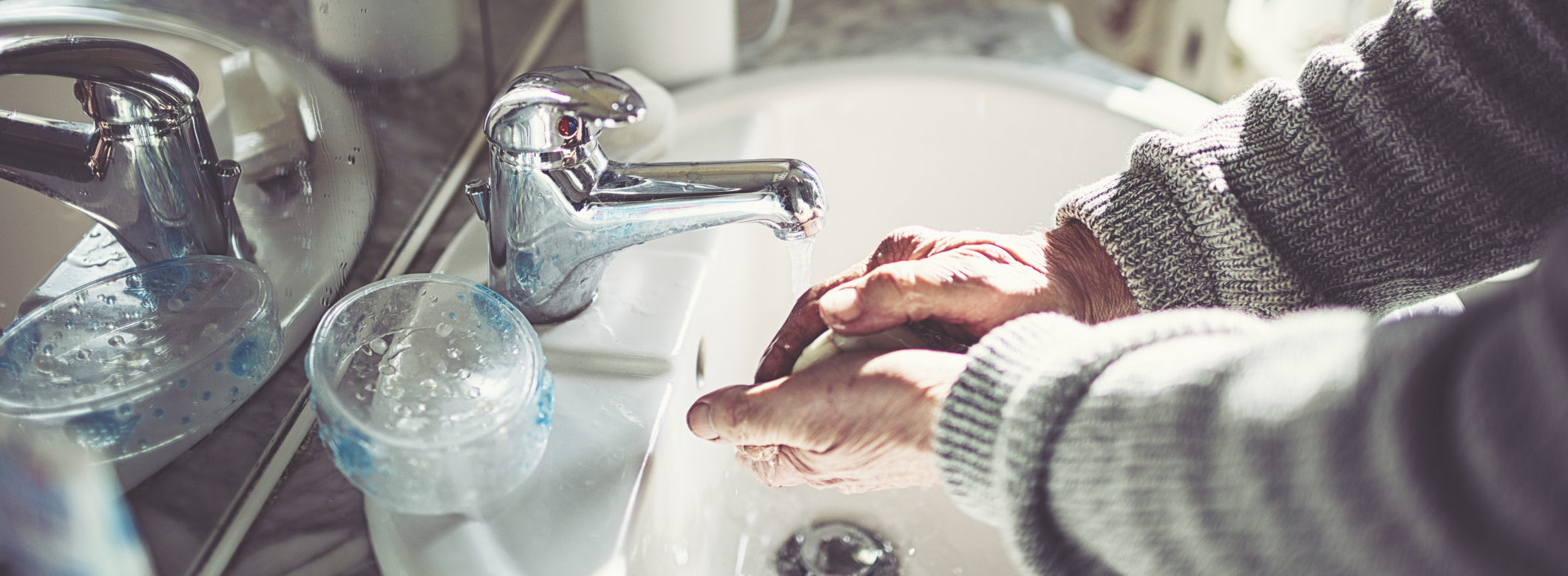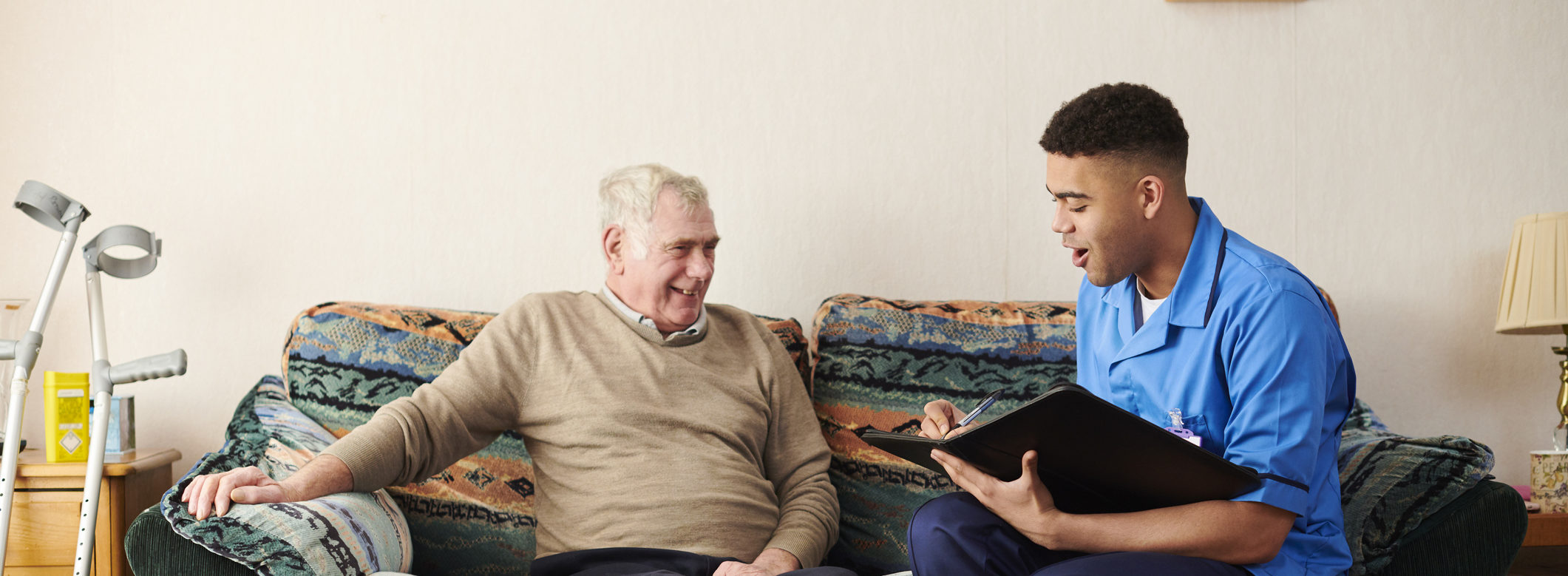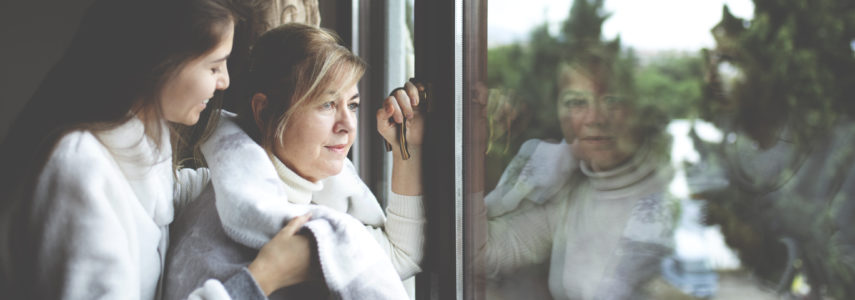Caring for someone with dementia can be difficult under “typical” circumstances. With daily life so heavily affected by the coronavirus pandemic, it is important to know how to continue to provide care for your loved one with dementia.
Here are 5 considerations when caring for your loved one during COVID-19:

1. Encouraging safe hygiene practices
The Alzheimer’s Association has stated that having dementia has shown no connection for increased risk of contracting COVID-19. However, certain dementia-related behaviors may lead a person with dementia to be more vulnerable.
Help with Washing Hands in Dementia Care.
A person with dementia may be more apt to forget to wash their hands, so it may be a good idea to leave a sign near the bathroom and kitchen sinks that reminds them to wash their hands with soap and water for at least 20 seconds.
Be sure to also demonstrate safe hand-washing in front of the person with dementia for your own wellbeing and as a cue.
If amenities for hand washing aren’t immediately available, have hand sanitizer with at least 60% alcohol available for use if your loved one is able to do so safely.
Ensure Social Distancing Practice in Dementia Care & Restrict Visitors.
If other people – whether family members or professionals – need to enter the home with your loved one with dementia, you can follow these simple steps to help decrease the risk for spreading COVID-19.
-
-
-
Take visitor’s temperature upon entering the home. If they are exhibiting a fever or other respiratory signs, it may be best to ask them to not enter.
-
Have visitor wash hands as soon as they get into the home.
-
Ensure the visitor wears a face mask.
-
If the person is a healthcare professional, you may consider checking their website for more information for their specific response to mitigating the spread of the novel coronavirus.
-
-
Know When to Call the Doctor During COVID-19.
While confusion is expected in Alzheimer’s disease and other dementias, the progression of confusion should be fairly slow. If you notice your loved one suddenly much more confused, you should consult their healthcare professional right away.
Unless the person is exhibiting a high fever or shortness of breath, the CDC is recommending calling the person’s healthcare provider first for most symptoms of illness such as coughing.
Many providers have expanded their telehealth services and can save a trip to the emergency room that may increase risk of being exposed to COVID-19.
2. Talking about COVID-19 with someone who has dementia
Depending on where they are in the disease process, it may or may not be a good idea to discuss the specifics of the coronavirus outbreak.
As the caregiver, you often know the person with dementia best and know what information may be too upsetting or confusing to your loved one.
Consider speaking in terms that they can relate to.
If he or she grew up during World War II, they may remember the rationing that happened at that time.
Remain calm and soothing.
Using simple sentences that are focused on safety and comfort can help ease any anxiety the person with dementia may feel when there is a shift in their daily routine.
For example, consider: “we have to stay inside today because that’s the safest for us right now. I will be here with you and we’ll be just fine.”

3.Maintaining a Structured Day
As a caregiver for someone with Alzheimer’s disease or other dementia, you know how important structure and routine can be for your loved one or client.
Maintain as much of the daily routine as possible.
Many activities of daily living are able to continue without interruption. You may want to plan ahead for grocery shopping and pharmacy needs.
Note: Many stores are offering curbside pick-up, but due to high demand, some need a good amount of lead time. For medications, you may want to call the primary care provider to see if you can have an extra supply of needed medications to further limit the need to go out shopping or to the pharmacy.
Find a similar alternative.
For activities that can’t happen during the social restrictions of the pandemic, you can consider similar options. If they typically go to the local senior center to play cribbage or bridge, for example, spend time playing these games at home.
Technology is your friend during this outbreak.
Set up as many telephone or video calls with loved ones to help provide additional social support to the person with dementia.
Not being able to see someone in-person may be jarring to the person with dementia, but may be soothed with a sentence like “Your daughter is unable to visit in-person today but we can give her a call. Let’s call her together and see how she is doing today.”
Are there are other activities that the person with dementia enjoys that would be safe to do during the pandemic?
Perhaps they love bird-watching, knitting, sewing, etc. These hobbies can be a great distraction to other changes in the daily routine.

4. Making Alternative Caregiving Plans
With everyone, including caregivers, being susceptible to falling ill, it becomes more important than ever to plan ahead for possible gaps in caregiving.
Many agencies are still open as essential services during the pandemic. Familiarize yourself with local agencies and know what services they offer and how quickly they are able to have a caregiver out to care for your loved one.
In addition to professional help, you may want to connect with a few trusted family members or friends who would be willing to step-up in the unfortunate event of you or another caregiver falling ill.

5. Practice self-care
You are working so hard to care for your loved one with dementia and let’s face it – doing something for yourself might be one of the last things on your list.
It is so crucial for you, as the caregiver, to also be cared for.
And providing self-care doesn’t always mean bubble baths and dark chocolate *although that can be nice, too!)
There are many practical ways for you to maintain your own well-being during the pandemic that don’t take a lot of time or energy. Check out 7 Ways Healthcare Workers Can Stay Sane During COVID-19 for some ideas.
We know how hard caring for your loved ones with dementia can be – and we thank you for the wonderful, challenging work that you do.
Want to know more? 
Join us for a free continuing education session for more information on Dementia Care & COVID-19.



